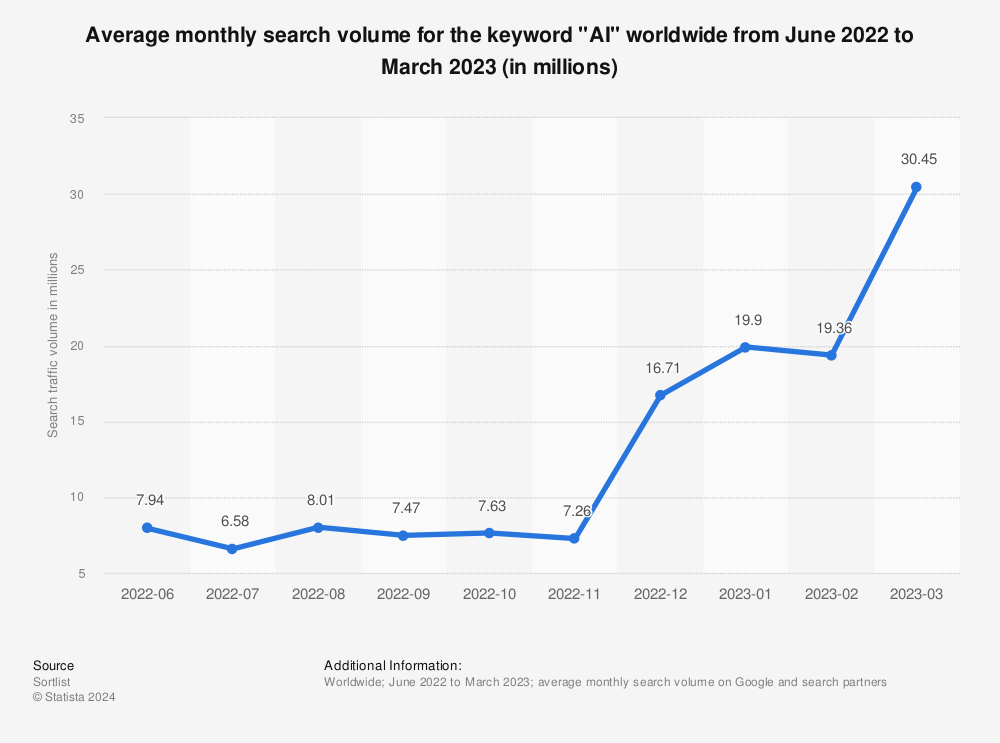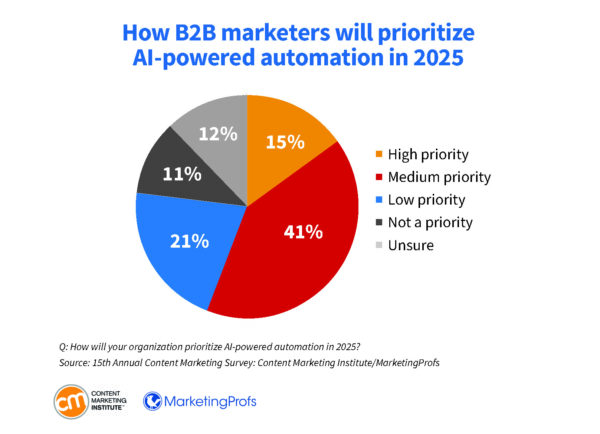Artificial Intelligence is hot in the streets. Straight gas. Sigma.
(I haven’t yet adjusted to being in my mid- late-thirties.)
Anyway…AI is one of the most talked about topics in the world.
One search for “artificial intelligence” on Twitter (I’m not calling it X) and you’ll be introduced to articles on how AI is shaping the future of healthcare, art, food, and more.
We shared last time that Ahrefs reported searches for the term “AI” doubled over six years.
Recent months have made this doubling look like child’s play.
Statista reports that since June 2022, searches for the term “AI” exploded by 283.5%.

Find more statistics at Statista.
How the B2B AI Market Has Evolved
In late 2021, AI was more of a marketing buzzword than a fully realized tool—used to dazzle without much substance behind it. Some brands treated AI like a shiny object, drawing attention without delivering real results.
Today, the landscape has shifted.
While there’s still work to be done, the days of empty AI promises are fading. Companies are now leveraging AI in meaningful ways, from boosting efficiency to driving smarter decision-making and unlocking new growth opportunities.
Still, there are questions to be asked and answers to be had.
Fortunately, this is something that NetLine has greater visibility into.
The Challenge
Better understand the…
- AI software market beyond its current buyers.
- Priorities where organizations are allocating resources towards.
- Top challenges in managing and using AI Software.
- Timeframe for additional investment.
The Goal
- Identify and understand how leading IT decision makers use or intend to use AI software and whether they intend to increase their investment any further within the next 12 months and beyond.
- Such observations should exclusively be captured via first-party interactions with IT buyers as they voluntarily registered and consumed related content.
How B2B Decision-Makers View AI Investment
According to NetLine’s buyer-level intent data, AI investment was riding high in late 2021, with nearly a third of businesses expecting to adopt it within 12 months.
2024 tells a very different story.
Today, over 60% of companies are delaying AI investments for more than a year, signaling a shift from short-term enthusiasm to strategic caution.
Despite all the AI-hype, more than 60% of B2B companies are delaying AI investments for more than a year—signaling a shift from short-term enthusiasm to strategic caution.
Click To Tweet
There are a few major factors behind this shift:
- Strategic Focus: Companies are aligning AI investments with long-term business goals.
- Data Privacy: Businesses need clearer understanding before committing.
- Market Maturity: As AI solutions advance, understanding how to use them effectively remains a challenge.
While the market’s focus in 2021 was on quick wins like automation, today’s conversations have shifted toward scalability, long-term value, and cybersecurity—factors that were barely on the radar before.
The timeline data makes one thing clear: B2B companies are in no rush to adopt AI.
Companies now prioritize thoughtful integration and future readiness over rapid adoption.
Question
What is your timeframe for additional investment for AI Software?
| Name | PCT. |
|---|---|
| Over 1 Year | 61.0% |
| 6-12 Months | 20.6% |
| 3-6 Months | 10.2% |
| Under 3 Months | 8.2% |
With 61% planning investments beyond 12 months, they’re prioritizing strategic preparation over quick wins. Meanwhile, 20.6% expect to invest within 6-12 months, suggesting growing momentum among those who’ve already begun laying the groundwork.
However, with only 10.2% planning action within 3-6 months and 8.2% ready to invest sooner, AI adoption remains complex and costly, requiring significant planning and budget alignment.
Marketers need to position themselves as guides, helping companies navigate these challenges and reinforcing the long-term value of AI—making thoughtful integration the focus, not rushed ROI.
NetLine isn’t the only business observing this delay in investment.
According to the Content Marketing Institute’s B2B Content Marketing Benchmarks, Budgets, and Trends: Outlook for 2025, more than half of B2B marketers (56%) plan to prioritize AI-powered automation in 2025.
Another 21% view it as a low priority, while 11% don’t prioritize it at all.

While the figures are not identical, they’re clearly related:
- NetLine: 39% of Respondents Prioritizing Over Next 12 Months
- CMI: 41% of Respondents Prioritizing Over Next 12 Months
Which Job Levels Prioritize AI Investment?
The real standout in NetLine’s data is the level of seniority among respondents.
Based on the responses, AI software decisions hold the attention of top-tier decision-makers across industries—demonstrating its growing importance at the highest levels of leadership.
- C-Level executives make up nearly a third of respondents, signaling strong buy-in from those steering the company’s direction.
- Directors (23%) and Managers (16.5%) were eager to respond, highlighting that AI is being discussed at multiple leadership tiers.
Responses by Job Level
| Name | PCT. |
|---|---|
| C-Level | 29.3% |
| Director | 23.0% |
| Manager | 16.5% |
| VP | 8.4% |
| Individual Contributor | 6.9% |
| Senior Manager | 4.4% |
| Senior Employee | 3.7% |
| Senior Director | 2.5% |
| Senior VP | 1.6% |
| Owner | 1.5% |
| Executive VP | 0.7% |
| Consultant | 0.7% |
While not on the same level, VPs (8.4%) and Senior Managers (4.4%) were significant contributors, confirming that AI is a cross-functional topic—engaging everyone in how AI might shape their future strategies.
Let’s dive further into the details on how B2B professionals responded to these questions.
What are Your Top AI Software Priorities You Are Allocating Resources Towards?
B2B companies are leaning into AI for security and efficiency.
With 18.8% focused on managing risks and cybersecurity, businesses are treating AI as more than an operational tool—it’s a shield against evolving digital threats. At the same time, 16.5% are turning to AI to automate routine tasks, highlighting their push for greater productivity and strategic bandwidth.
Key priorities include:
- Automating & optimizing routine tasks (10.7%): AI frees teams from repetitive work.
- Improving decision-making (10.7%): AI helps businesses act faster with better insights.
- Leveraging ChatGPT & emerging tech (6.4%): Interest is growing, but cautious adoption prevails.
- Responsible AI (2%): Ethics remains a low priority, signaling a need for greater focus.
For marketers, the opportunity lies in helping businesses adopt AI responsibly—addressing both practical automation needs and governance challenges. Companies need solutions that balance efficiency with ethics, aligning AI efforts to their long-term goals and values.
Question
What are your top AI Software priorities you are allocating resources towards?
| Name | PCT. |
|---|---|
| Managing risk, fraud and cybersecurity threats | 18.8% |
| Automating routine tasks | 16.5% |
| Helping people make better decisions | 10.7% |
| Automation & optimization of routine tasks | 10.7% |
| Processing data & generating insights | 9.1% |
| Data-driven decision making & predictive reporting | 8.0% |
| Applying ChatGPT & emerging technologies | 6.4% |
| Operationalize AI | 6.1% |
| Gather forward-looking intelligence | 5.1% |
| Automating customer operations | 3.8% |
| Using AI-powered chat bots & customer support | 2.8% |
| Responsible and ethical AI | 2.0% |
What are Your Top Challenges in Managing and Using AI Software?
Managing AI software is revealing some clear friction points.
- Data management tops the list (29.5%), highlighting that even with advanced tools, wrangling data into meaningful insights remains a pain.
- Transparency issues (22.3%) with evolving algorithms show that trust in AI isn’t automatic—teams need to understand the “why” behind the outputs.
- Meanwhile, automation optimization (7.8%) and the rise of tools like ChatGPT (6.7%) present both opportunities and headaches.
AI promises efficiency, but these findings suggest that success depends on getting the foundation right—clean data, clear insights, and trust in the technology.
Question
What are your top challenges in managing and using AI Software?
| Name | PCT. |
|---|---|
| Difficulties with Data Management | 29.5% |
| Lack of transparency as algorithms learn and become more complex | 22.3% |
| Difficulties with Data Management Processing data & generating insights | 8.0% |
| Automation & optimization of routine tasks | 7.8% |
| Applying ChatGPT & emerging technologies | 6.7% |
| Dataset Management | 6.4% |
| Data-driven decision-making & predictive reporting | 5.7% |
| Leveraging Chat Bot Analytics | 5.5% |
| Data Archiving | 4.0% |
| Using AI-power chat bots & customer support | 2.2% |
| Leveraging Chat bot | 1.9% |
Key Takeaways for B2B Marketers
Let’s not get it twisted, here: AI investments are inevitable.
However, most businesses remain in preparation mode.
Helping them understand AI’s long-term value will set savvy marketers apart from competitors making premature claims.
AI investment is a long-term game. Marketers need to understand that businesses are focused on future readiness, not immediate wins. Vendors and marketers should align messaging to help businesses prepare for AI’s future potential, rather than rushing them toward adoption.
Implications for the Market
- Caution and Strategy: Companies are still ironing out their AI readiness and integration strategies, making education and thought leadership critical in this phase.
- Challenge of Justifying Immediate ROI: With many delaying investments, those claiming quick ROI may miss the bigger picture. Marketers need to demonstrate the value of long-term, well-planned AI investment.
Priorities and Challenges
The delay in AI adoption reflects concerns around:
- Integration: AI needs to work seamlessly with existing systems, and businesses are cautious about the complexities of making it happen.
- ROI Uncertainty: Without immediate value, businesses are hesitant to invest, which is why proving long-term benefits will be critical.
Don’t Confuse Patience with Apathy
While there’s still work to be done, the days of empty AI promises are fading.
Companies are now leveraging AI in meaningful ways, from boosting efficiency to driving smarter decision-making and unlocking new growth opportunities.
How This Data Was Captured
NetLine’s INTENTIVE platform offers B2B marketers unmatched, real-time visibility into buyer-level intent by combining first-party data with online and offline insights. It tracks behavior across 11,000+ topics, 247 industries, and over 100 million offline activities via Informa events. Key features include:
- Buyer discovery and prioritization tools to target in-market buyers.
- Event Intent for tracking offline engagement, adding a layer beyond digital signals.
- Dedicated integrations and automated notifications to streamline outreach.
By focusing on “who, what, where, and when” buyers engage, INTENTIVE removes the guesswork, helping marketers act faster and with more precision to drive revenue.
Move beyond account-level data and start your buyer-level intent discovery journey—explore our site for more details.
